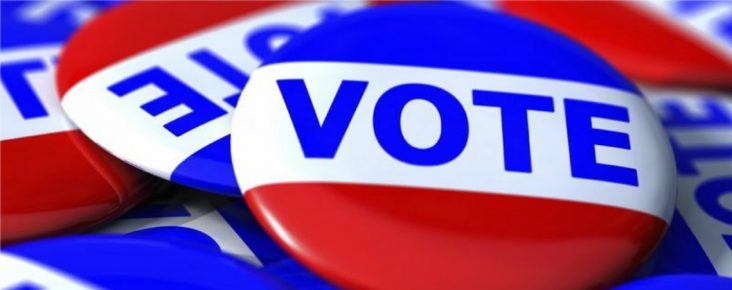State Election Commission rejects open primaries-ranked voting ballot title, approves redistricting
by July 22, 2020 8:55 pm 1,329 views

On a day when a spate of poll questions were released showing support for changing Arkansas’ election and redistricting processes, the State Board of Election Commissioners voted to not certify one proposed ballot title, approved another, and delayed voting on a third.
The board voted Wednesday (July 22) against moving forward with the ballot title for the amendment proposal that would change Arkansas’ elections to an open primary process with ranked choice voting. The group supporting the measure, Open Primaries Arkansas, collected more than 94,000 signatures earlier this month for the proposal that would advance to the general election the top four candidates in a primary election regardless of party affiliation, with space for a write-in candidate provided. Voters then may rank their preferences when they cast their ballots in the general election. If no candidate wins a majority, the last-place candidate is eliminated and the voter’s next choice is awarded the votes. The process continues until a candidate wins a majority.
Secretary of State John Thurston, R-Ark., ruled earlier last week that the group did not properly provide background checks of paid canvassers. He summarily told the group that their petitions were invalid. A legal challenge to the Arkansas Supreme Court is underway.
At question Wednesday was the sufficiency of the ballot title, which the state board has new authority to oversee, and whether it was straightforward enough for voters to interpret. This is the first time the State Board of Election Commissioners has ruled on measures through this process thanks to a state law passed in 2019. Formerly, the Arkansas Attorney General would have ruled on a ballot title’s sufficiency prior to signatures being collected.
“This issue is 100,000 to 1. Over 100,000 Arkansas voters have made their voices heard that they want open primaries,” said Stephanie Matthews, campaign manager for Open Primaries Arkansas. “John Thurston is the one who will stop at nothing to get this kicked off the ballot. He, party bosses, and special interests know that if voters have their say, we will have open primaries in Arkansas. We will fight this in the courts until Arkansas voters have their voices heard and this is on the ballot in November.”
Thurston chairs the State Board of Election Commissioners. Doyle Webb, chairman of the Republican Party, has stated that he and the state GOP will oppose the measure. Democrats have not taken an official stance, although party Chairman Michael John Gray says he supports it.
Jonelle Fulmer, co-chair of Arkansans for Transparency, which opposes the open primaries and ranked voting proposal as well as another measure to change how Congressional and legislative districts are determined, gave the board credit and criticism.
“We applaud the State Board of Election Commissioners’ decision not to certify the Open Primaries (a.k.a., Ranked Choice) amendment for the November ballot. While we fully expect an appeal to the Arkansas Supreme Court, this decision underscores the confusing and deceptive nature by which this ballot title was written,” she said.
Fulmer indicated that more challenges were in store for the redistricting amendment, which was approved.
“As for the decision to certify the redistricting amendment, we are committed to using every available resource under the law to challenge this veiled attempt by the same out-of-state group to fundamentally change the laws that have governed redistricting in our state for decades. Arkansas voters deserve complete transparency at the ballot box, and Arkansans for Transparency will continue to fight back against out-of-state billionaires who wish to manipulate our system of the democracy and destroy the constitution as we know it.”
A third proposed constitutional amendment that has submitted signatures, but is sidelined due to Thurston’s ruling regarding background checks of paid canvassers, would expand casino gaming in Arkansas by adding 16 new licenses. The State Board of Election Commissioners delayed a decision on that ballot title for one week.
POLL SHOWS SUPPORT FOR CHANGES TO ELECTION PROCESS
Earlier Wednesday, the League of Women Voters of Arkansas released poll results showing support for the non-partisan redistricting commission concept as well as open primaries and ranked choice voting.
The poll, conducted by Mercury Analytics, surveyed 600 Arkansas voters online from July 16-18, 2020. The margin of error is +/- 4 percentage points.
Almost two-thirds of those surveyed supported creating a nonpartisan redistricting commission. There was also nearly two-to-one support for the concept of establishing open primaries and instant runoffs through ranked voting.
“More than just signatures, this clearly demonstrates that Arkansas voters want more voice in the redistricting process and they want to vote for the candidate of their choice — no matter their party affiliation,” said Bonnie Miller of the League of Women Voters of Arkansas. “A dark money group is trying to pressure the Secretary of State to eliminate their voice in the process. Their reasons are abundantly clear: if voters are allowed to have their say, these ballot measures will pass.”
Louisiana, California, Washington, and Nebraska have open primaries similar to the Arkansas proposal’s provision. Maine is the only state with ranked choice voting.
Some of the questions, wording and results of the Mercury survey include:
- 65% strongly or somewhat support establishing “an independent citizens commission instead of allowing politicians to draw their own district lines.” 17% somewhat or strongly oppose.
- 59% strongly or somewhat support establishing “a ranked choice voting system in the general election that ensures a winning candidate receives a majority of the votes cast.” 25% somewhat or strongly oppose.
- 56% strongly or somewhat support replacing “the two-party primary system with a single non-partisan primary where anyone can vote and the top vote getters advance to the general election.” 33% somewhat or strongly oppose.
- 60% strongly or somewhat support allowing “voters to rank their top four candidate when voting in the general election so voters can have more say in their second choice candidate.” 28% somewhat or strongly oppose.
